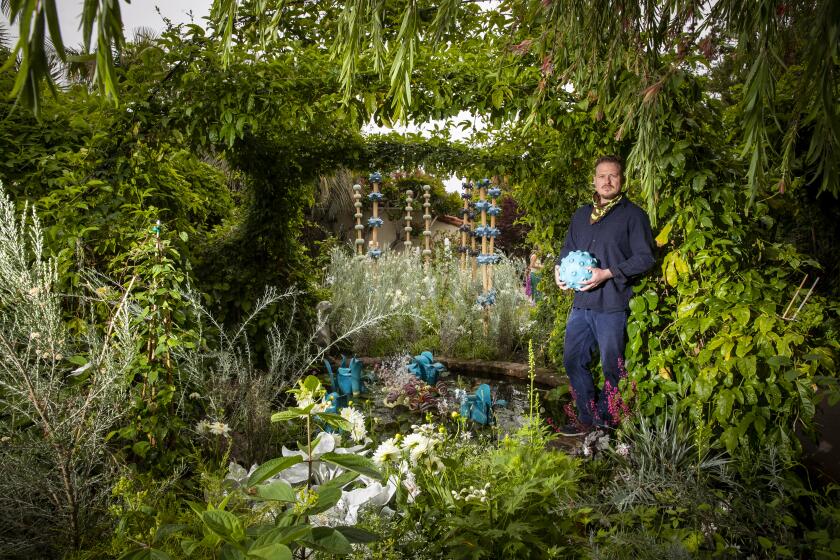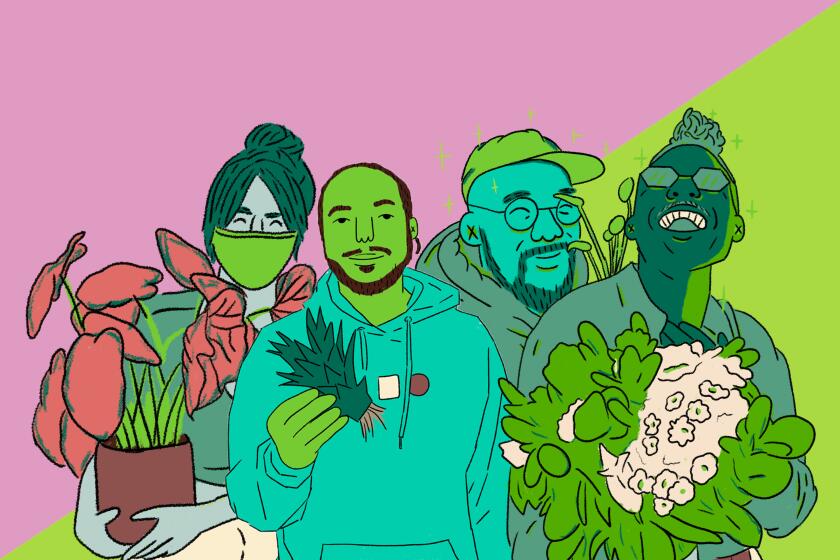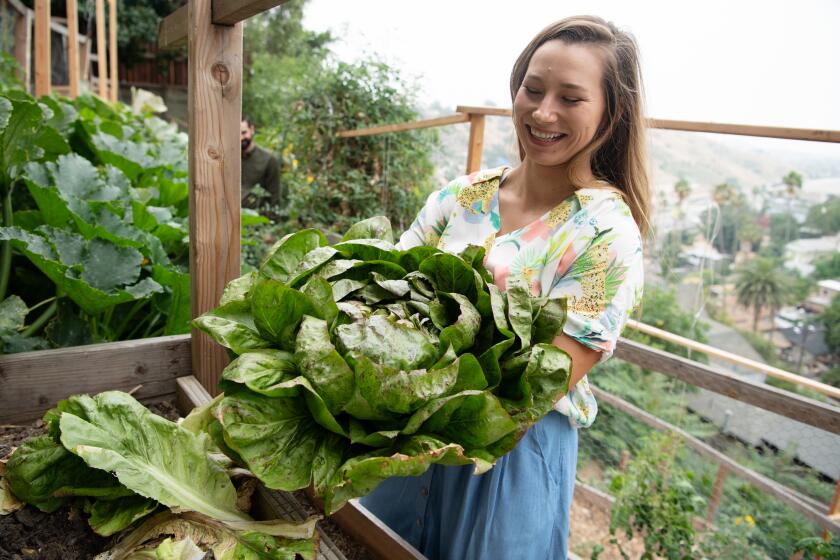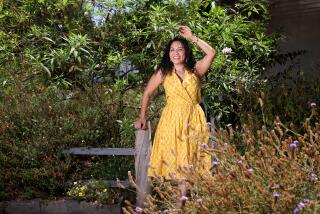He turned his concrete patio in East L.A. into an edible garden with fruit trees
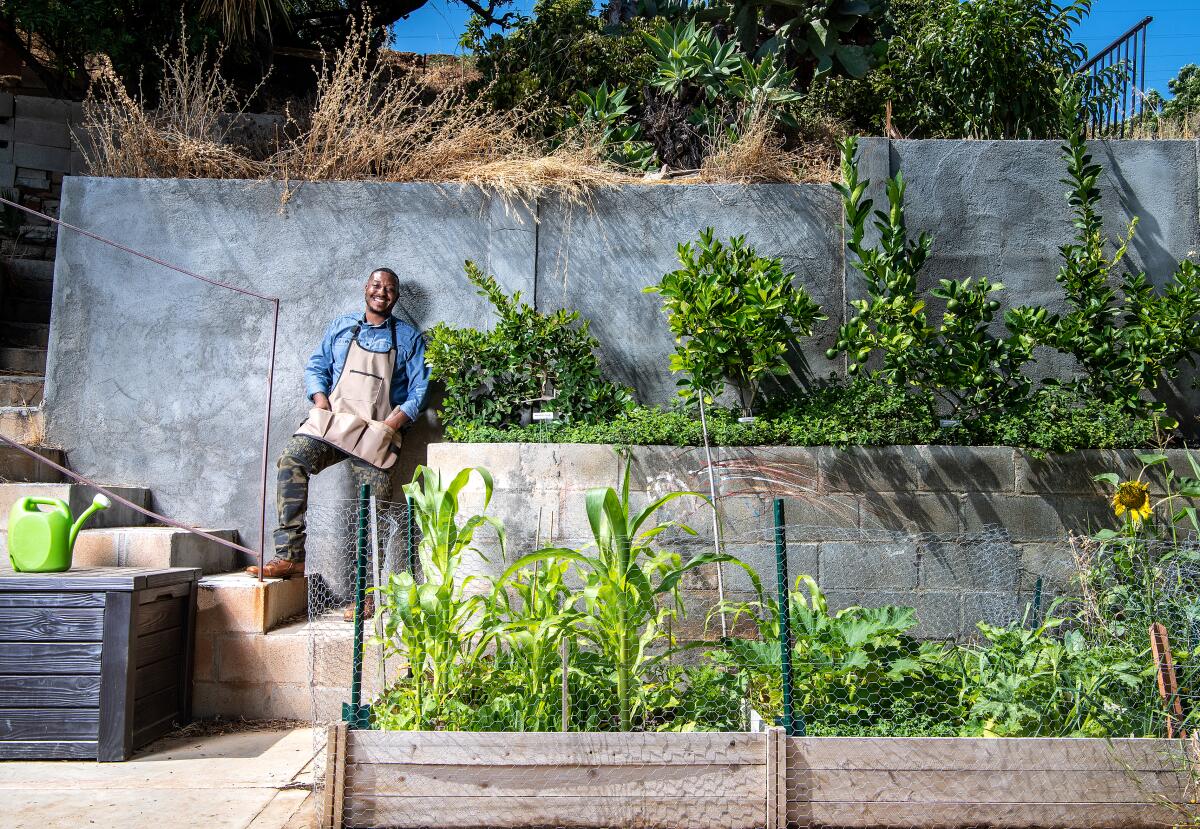
- Share via
This is the latest in a new series we call Plant PPL, where we interview people of color in the plant world. If you have any suggestions for PPL to include in our series, tag us on Instagram @latimesplants.
Ken Sparks is a sentimental gardener.
The Ohio native’s East L.A. garden is filled with more than 50 types of fruit trees and plants, some of which pay homage to his family and reflect the diversity of his hometown of Twinsburg.
“I have little pieces of home in my garden,” said Sparks, 37, as he identified water lilies and an heirloom beefsteak begonia from his grandmother’s garden. “One of the things that keep me grounded is my garden. It reminds me of my family and of Ohio. “
Get The Wild newsletter.
The essential weekly guide to enjoying the outdoors in Southern California. Insider tips on the best of our beaches, trails, parks, deserts, forests and mountains.
You may occasionally receive promotional content from the Los Angeles Times.
He grew up gardening alongside his grandmother. When she died in July 2019, he planted peach, apple, plum and nectarine trees in her honor.
His terraced backyard is primarily concrete, but he has managed to transform the hardscape into something alive and soft with chickens, a butterfly garden and a surplus of organic vegetables he has planted in raised beds installed on top of concrete.
In addition to his mini fruit orchard, he is growing corn and carrots; chard and squash; beans and tomatoes. African blue basil and unusual mints — pineapple and strawberry — occupy the bees. As an experiment, he is growing pineapple in a wine casket. And in front, monarch butterflies flock to the parking strip he removed and replanted with milkweed, sunflowers, butterfly bush and lavender.
Viewed in the midst of a pandemic, this art-filled garden in Corona del Mar provides a sense of calm. It’s the perfect afternoon getaway you could use right now.
Over the years, he has revitalized community gardens in Illinois, Ohio and Watts. “It is imperative that communities are provided with gardening resources, holistic programs and activities,” he said.
So when his work as a musician and a production coordinator stalled due to the coronavirus pandemic, Sparks started Farmer Ken Official on Instagram and pivoted to garden consulting.
Following Blackout Tuesday, and the recent emphasis on Black-owned businesses, his account went from 1,500 followers to 7,000 (he now has more than 10,000).
“A lot of people are reaching out to me for edible gardening advice,” Sparks said. “My goal is to help others start their gardens and expose the community to organic gardening and healthy cooking and eating.”
Why did you start your Instagram account?
I initially started my Instagram account last fall to share my plant and garden journey and connect with other gardeners.
What are your favorite plants?
My favorite plant is the sunflower. They are majestic, hardy, tall and come in a variety of colors. There are many colors other than the traditional yellow ones. I love the multibranched ones because they bloom over an extended period of time. Here in L.A., we can grow them year-round. They also attract pollinators, which are needed for the fruit to develop. Sunflowers also have the incredible ability to pull heavy metals from the soil and clean contaminated soil.
In our Plant PPL series, we interview people of color in the plant world, including plantfluencers, plant stylists, floral artists, enthusiasts, experts and garden store owners.
What are your plans for when the pandemic is over?
The implementation of community garden spaces in areas where space is limited, which is common in many urban communities, and helping to identify a common place where people can have the plot to grow their own produce.
Additionally, garden education is important. There are skills that are learned through experience and there is a science behind some of the techniques that are used. One of my goals is to equip people with knowledge to be successful with their own gardens.
I have launched my Etsy shop, which has some plants, herbs and seeds for purchase. I have also provided fresh eggs and herbs at a local farmers market. For garden consultation, the Farmer Ken Co., I am providing garden planning and implementation to clients that are tailored to their space and needs. (This may have some limitations due to COVID-19.)
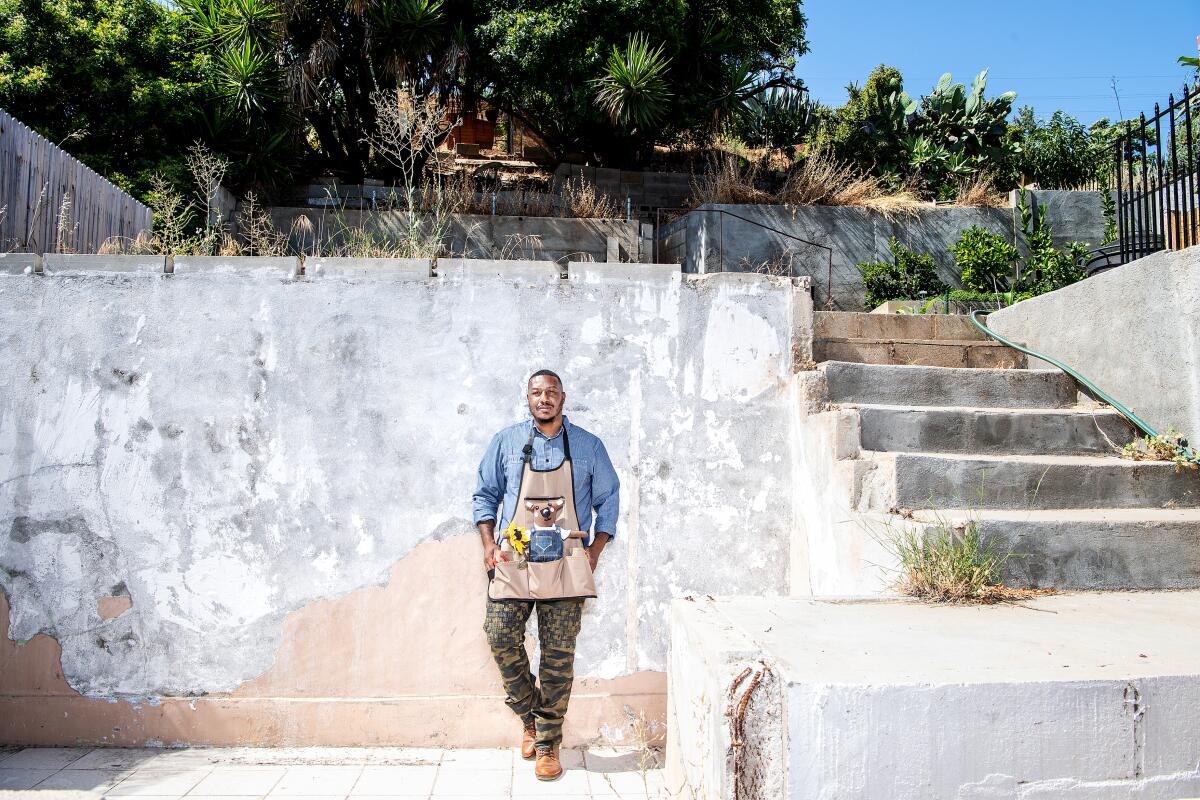
Can you offer any advice to people who, like you, have a lot of concrete?
There are a lot of creative ways to grow and utilize space. You can grow in raised beds, pots and planter boxes. To expand my garden, I placed six raised beds on top of a concrete area in my backyard. In those raised beds I am growing corn, squash, carrots, garlic, chard, kale, cucumber, beans, lettuce and tomatoes. I am also growing strawberries and some herbs in pots.
Many vegetables can successfully be grown in smaller areas, and there are certain varieties that require less space. For instance, bush beans [and] bush cucumbers produce full-sized fruit that do not form long trailing vines. Husky cherry tomatoes are compact and perfect for a patio garden space. Dwarf and ultra-dwarf cultivars of fruit trees produce full-sized fruit but take up far less space than full-sized trees. Kale, chard, lettuces, spinach, greens, carrots [and] tomatoes can grow in small areas. Many herbs also do well in pots.
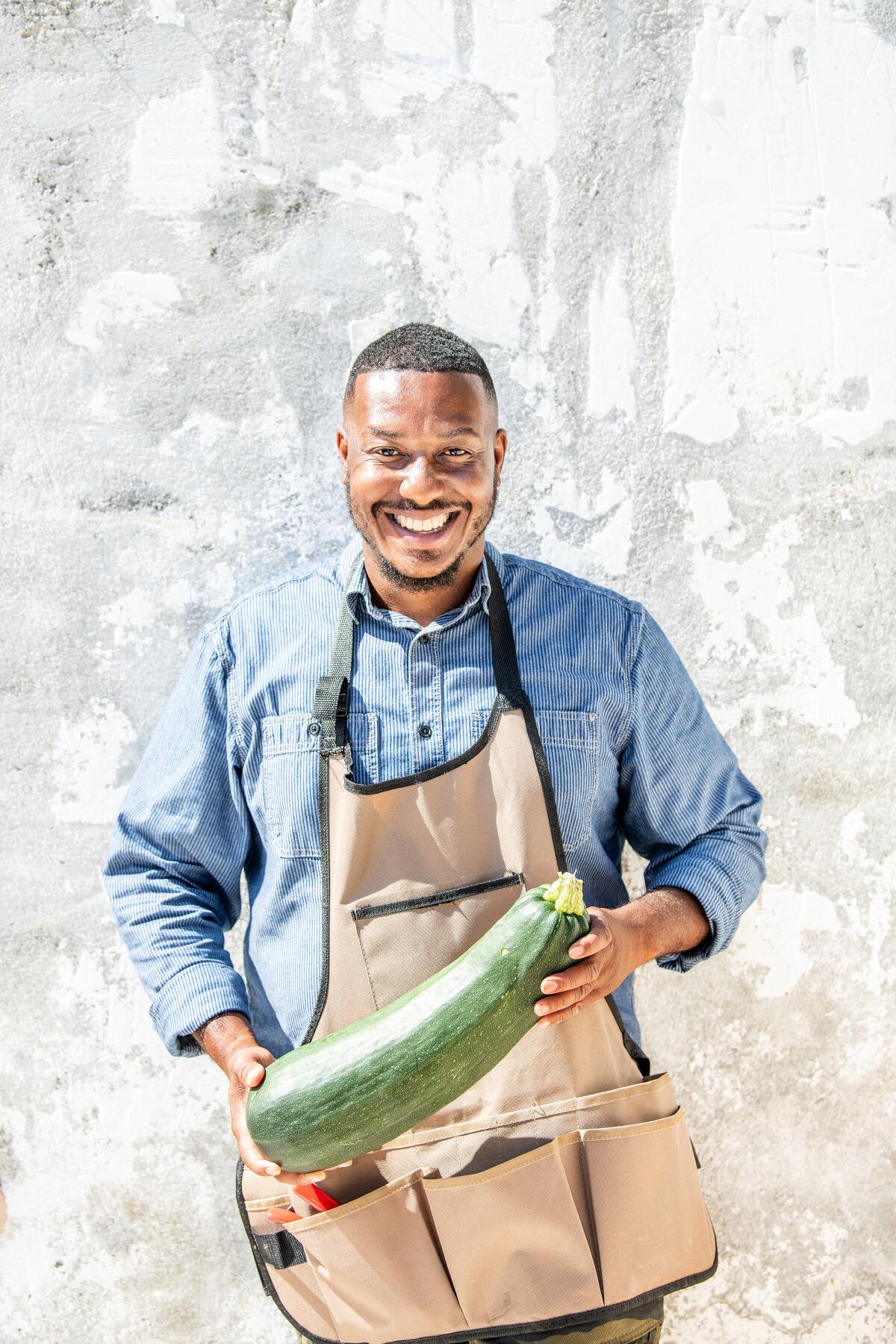
How do you decide what edibles to grow?
I decide what to grow based on the season. Here in California, cool-weather crops are grown in fall, winter and early spring, and hot-weather crops are grown in the summer. Some examples of cool-weather crops are lettuce, peas, greens, spinach. Some examples of summer crops are corn, beans, zucchini, tomatoes. I also grow a variety of fruit trees and shrubs including apples, pears, peaches, nectarines, mangoes, blackberries, blueberries, pomegranates, citrus and bananas that ripen at various times throughout the year. Gardening is about experimentation, and I sometimes grow plants “out of season” to see if they will successfully produce.
You’ve worked with kids in Chicago and Los Angeles. How does gardening impact them?
One of the greatest impacts that I have seen is watching youth take pride and ownership in designing and planning their growing space and harvesting their own food. I take a holistic approach in programs that I have implemented, whereas partnerships were developed to provide healthy cooking and fitness opportunities for youth, their families and the community.
Joanna Bassi’s days as a television production assistant were stressful and uninspired. She had to change her life. Her first step: “I looked at the weeds growing on my hillside and thought, ‘I want to create an ecosystem.’”
Coming from Ohio and Illinois, what’s the most exciting thing for you to grow here?
I am most excited about growing anything tropical that I was not able to grow in a colder climate. One of my current garden favorites is my mango tree. I actually have a couple of mangoes developing this year and am excited to try them!
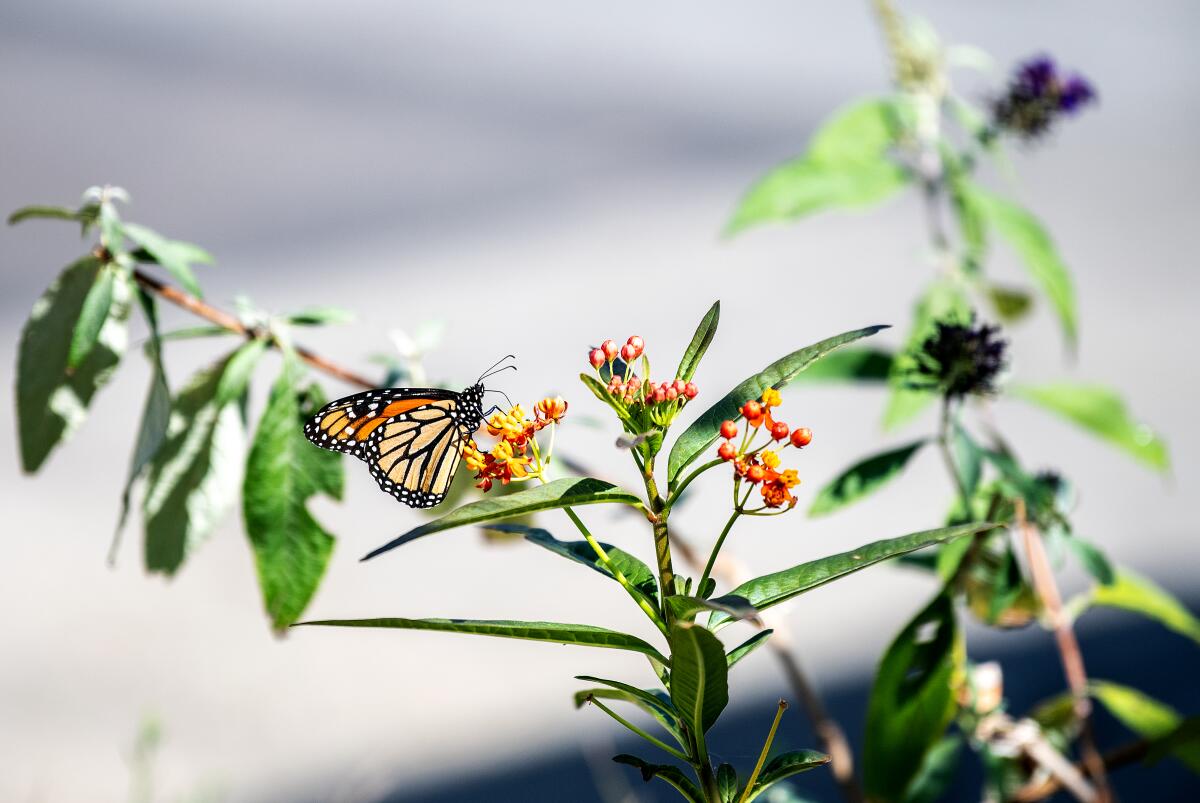
What is the most important thing to know about growing your own food?
The flavors of homegrown food are so much fresher than those you purchase from the store. Having your own garden is very rewarding, and it is also therapeutic. It is amazing when you plant your seeds, nurture your plants and reap the reward of your harvest! You also know exactly what you are putting in your body, versus not really knowing what byproducts you are eating when you purchase from the store. I grow organically and pesticide-free.
You are sentimental about plants. Can you share why?
I am very sentimental about some of my plants. I have an heirloom beefsteak begonia potted in one of my garden spaces. I started the plant from a small cutting after my grandmother passed away last year and it started blooming this year. It is like having a piece of home here in my garden space in L.A.
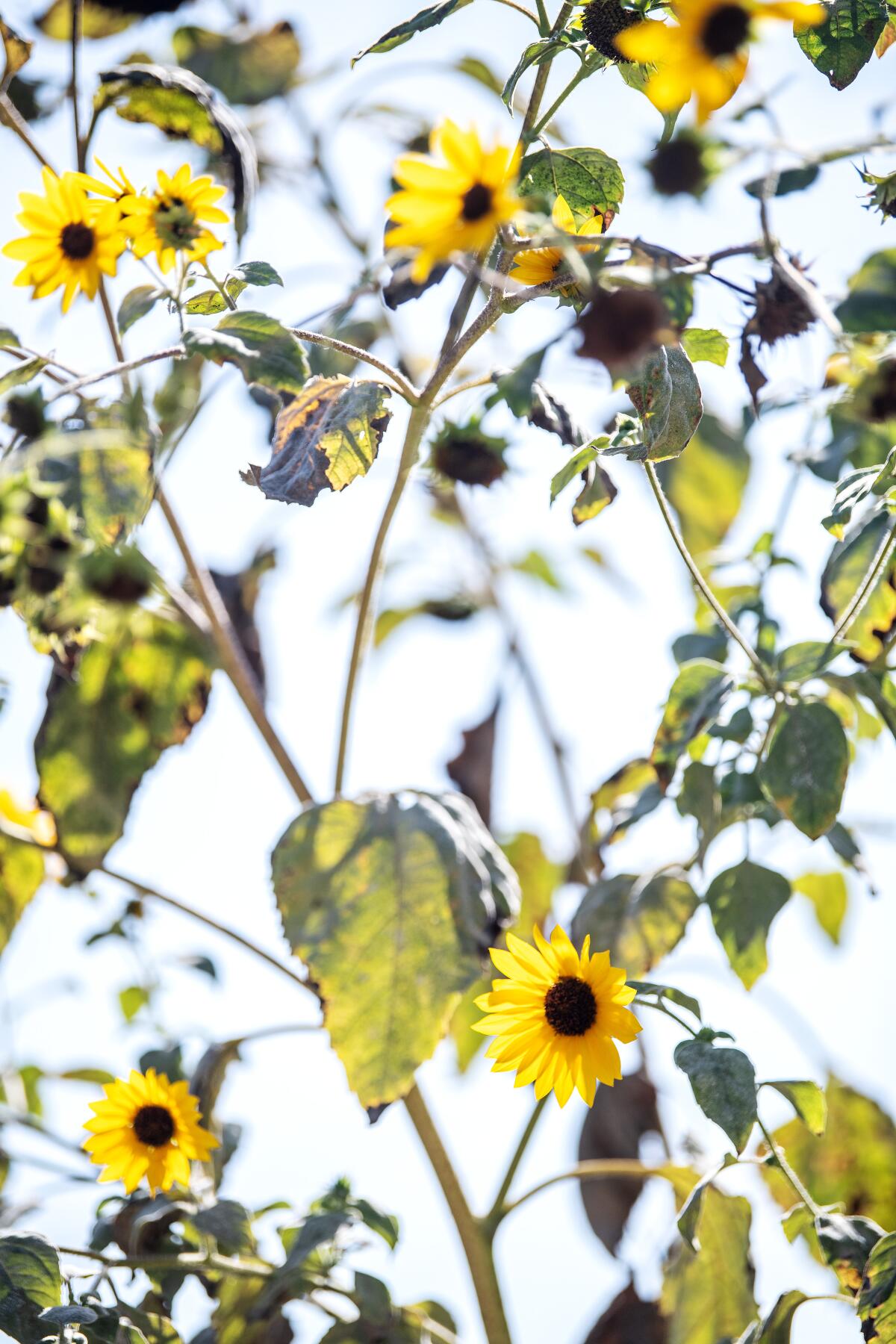
More to Read
Sign up for The Wild
We’ll help you find the best places to hike, bike and run, as well as the perfect silent spots for meditation and yoga.
You may occasionally receive promotional content from the Los Angeles Times.
